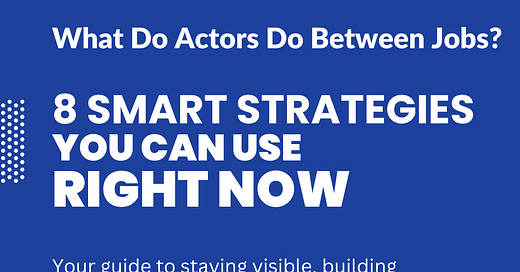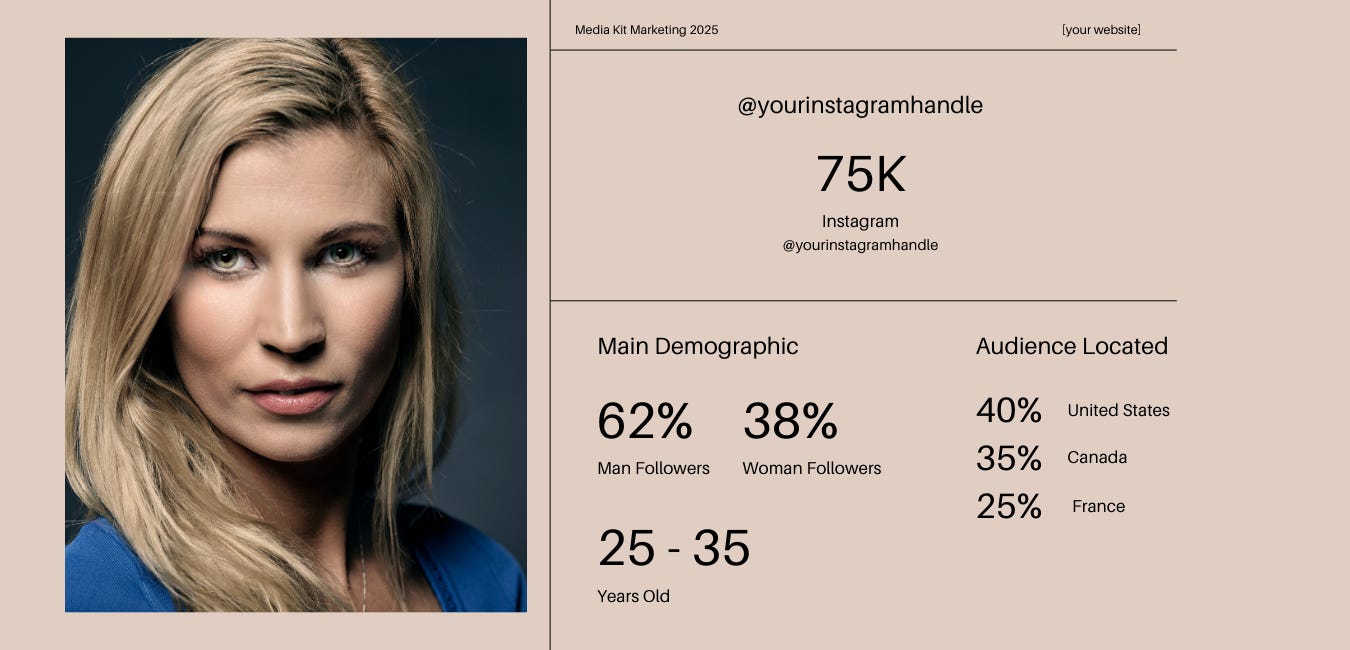What Do Actors Do Between Jobs? 8 Smart Strategies You Can Use Right Now
Your guide to staying visible, building momentum, and creating career breakthroughs between acting gigs.
The audition’s over. The project wrapped. Your calendar is… quiet. For many actors, the time between jobs can feel uncertain—even defeating. But here’s the truth: what you do in between jobs is just as important as what you do on set.
I’ve had actors who used to panic between gigs—until they realized this in-between time was actually where careers are made.
The most successful actors use their “off time” to build, stretch, connect, and grow—so when opportunity knocks, they’re not just ready… they’re unstoppable.
Between gigs is where pros separate from hobbyists.
So if you’ve ever asked yourself, “What should I be doing while I wait for the next gig?”—this is your new go-to playbook.
1. Rebuild Your Materials (Yes, Again)
You’d be shocked how many actors keep sending out outdated resumes, tired bios, or a demo reel that doesn’t reflect their current skill level. Between jobs is the perfect time to revisit your headshot, resume, IMDb page, and Actors Access profile.
Pro Tip:
Even small tweaks—like updating your bio tone or reordering credits—can shift how casting sees you.
Bonus Move:
Create a polished PDF presentation of your career highlights (including red carpet shots, press features, awards, and film stills) to keep on hand for agents, producers, or visa applications. This is what we call your Personal Portfolio Deck.
2. Work on Your Craft (On Your Terms)
Use this time to grow. Not just any acting class—look for training that matches your brand or challenges your weak spots.
Need sharper cold reads? Join a cold read Zoom gym.
Struggle with vulnerability? Try scene study with emotional recall.
Thinking about adding a new accent to your toolkit? I trained in a Russian accent, told my agent, and she started submitting me—and yes, I booked roles because of it.
Want to improve your on-camera stillness? Film yourself weekly and watch it back. Better yet, team up with a few actor friends and start a Sunday acting group. Run scenes, grow together—and consider posting your sessions on a YouTube channel so others can follow your journey. Who knows? It might even gain a cult following. And once you reach the right view count, YouTube can start paying you. Worth the try—especially if you’re already having fun. Why not have fun and gain exposure and make some money?
Real-World Example:
One of my clients landed a role after applying an idea we worked on during her one-on-one career consultancy session. I encouraged her to use her between-jobs time to film self-tapes of high-intensity scenes and build a personal archive. Later, during a general meeting, a producer watched a few of those tapes—and they made such an impression, she was offered the role.
Silence doesn’t mean failure—it’s space to get better.
Pro Tip:
Don’t just train for the sake of it—train with a strategy.
3. Submit to Indie Projects, Artist Labs, & Pre-Production Roles
Big projects are great—but indie films, student films, and works-in-development are often casting quietly months before they hit mainstream breakdowns.
Bonus Move:
Check IMDb Pro for films marked “pre-production” and research the casting directors or producers. Reach out with a short, respectful pitch and your updated materials.
Example Pitch:
Hi [Name],
I saw you’re in pre-production for [Project Title]. I’d love to be considered for roles that align with my profile. I’m a bilingual actress with strong dramatic experience and a recent indie feature lead. Here’s the link to my resume and demo reel: [Insert Link]
Warmly,
[Your Name]
4. Build a Digital Presence That Gets You Seen
This is where today’s actors shine—if you use it wisely. Between jobs is your content creation playground. Think of it as building your own stage.
Example:
TikTok creator Julian Sewell gained massive attention by writing and starring in his own mini soap operas, notably the series Paloma Diamond. His videos feel like juicy, low-budget TV shows—and casting noticed.
What You Can Do:
Create a short-form series, monologue series, or even “day in the life of an actor” content
Post 1x a week to TikTok, Instagram, or YouTube Shorts
Show range, emotional depth, or comedic chops
Pro Tip:
Use Canva to design a branded Social Media Portfolio—include your follower stats, engagement highlights, and content links. This is your actor-influencer calling card for pitching brands or reps.
5. Reconnect & Nurture Your Network
No, not a mass “Just checking in!” email. Instead, be strategic. Follow up with a casting director who called you back recently. Congratulate a director on their festival win. Send a “thinking of you” note with value—not desperation.
Pro Tip:
Set a “Networking Friday” on your calendar. 30 minutes. Reach out to 1–2 people with warmth and sincerity. It’s about relationship-building, not job-hunting.
Bonus Move:
Create a simple contact spreadsheet to track who you’ve reached out to, why, and when to follow up again.
6. Work on Your Brand Voice
Your brand isn’t just your type—it’s your tone, story, and strategy.
Are your materials aligned with the kind of roles you want to book?
Is your website telling the right story about you?
Do you have a clear message across your social platforms?
Pro Tip:
Use the between-jobs period to refresh your brand tone—play with new loglines, add BTS shots, update your pinned post or Instagram bio.
7. Diversify Your Income Strategically
You don’t need a job to work—you need a mission.
It’s common to work side gigs—but what if your “survival job” supported your acting, instead of draining you?
Smart options:
Voiceover work on platforms like Fiverr, Upwork, or ACX
Social media content creation (pitch to microbrands!)
Teaching acting or coaching on Fiverr or Zoom
Get involved with SAG-AFTRA, the SAG Foundation, or your local union chapter—many offer paid opportunities and programs
Work or volunteer for a casting director to gain experience and build connections
Start a podcast, blog, or newsletter—share industry insights, personal stories, or interviews, and once you’ve built a following, you can monetize by offering ad space, sponsorships, or cross-promotion to acting-related services and brands.
Creating digital products: monologue packs, actor guides, etc.
Pro Tip:
Build a system, not just hustle. Automate what you can. Protect your audition flexibility.
8. Take Care of Your Mental Health
Don’t underestimate the emotional weight of waiting. Rejections pile up. Silence feels personal. But between jobs is also when you can reset your inner engine.
Ideas:
Try a 10-minute daily mindset reset (journaling, breathwork, guided visualization)
Follow one inspiring industry podcast or newsletter (cough—like this one)
Give yourself permission to rest without guilt
Looking for a tool to support your mindset? I created The Wellness Journal as a calming space to reflect, reset, and recharge. It even includes a vision board section to help you clarify your goals and stay inspired between milestones.
Pro Tip:
Set 3 daily wins—not tasks. (Ex: “Sent one follow-up email,” “Taped a monologue,” “Did a walk to clear my head.”) Small wins build momentum.
You’re Not Waiting—You’re Building
Between jobs isn’t a passive lull—it’s a powerful phase of recalibration. Whether you’re creating, training, connecting, or pitching—you’re actively shaping your next opportunity.
And if you want to take it even further…
Want More? Join the Deep Dive Series Built for Working Actors
Inside the Cast Forward premium edition, you’ll get immediate access to:
Deep-dive articles on career strategy, branding, networking, and how to stay visible between gigs
The Actor’s Confidence Playbook—my exclusive guide to mastering mindset, silencing self-doubt, and showing up with unshakable presence in every room.
Occasional casting notices curated for emerging and working actors
Weekly tools, insights, and high-level tips trusted by actors building real careers
First access to premium guides and resources before anyone else
You’re not just an actor—you’re a force in motion. Ready to build momentum?
Next up on Cast Forward:
Think networking is just about handing out business cards or “checking in”? Think again. In next week’s article, I’ll break down the biggest misconceptions about networking—and why most actors waste opportunities without even realizing it. If you want to start building real industry relationships (without feeling fake), you won’t want to miss this.




